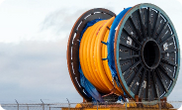What is the best ethernet cable for gaming?
Want to choose the best ethernet cable for gaming? The answer is CAT6. In most instances, there is no reason to go beyond that even if other options are marketed to you. Let's get into the details.

Ethernet Cables For Gaming Best Practices
- Generally, any standard Cat6 FT4 cable is a great enough cable for gaming in residential settings.
- Most users will not notice any differences between CAT 5e, CAT 6, and CAT6a while gaming at home.
- CAT7 and CAT8 are overkill for gaming purposes at home; you will likely notice no difference between CAT6 and CAT6A as you will never push over 10GB Gbps with your PC, and a very high bandwidth is not necessary. Since CAT7 and CAT8 are more expensive, there is no reason to overpay. They are the data center cables not meant for home. In addition, CAT7 is not even an actual TIA standard, so you can just sell a repackaged CAT6 cable at a higher price. There are no arguments for using CAT7/CAT8 for gaming beyond marketing.
- CAT6 cables you should use in your house should be solid core, pure copper, and bulk. This will give a high-quality signal with integrity and will save you money.
- Most of Cat5e, Cat6, and Cat6a are unshielded, as shielding is not required for 10GB speed, nor is it needed for Gigabit Ethernet. Ethernet cables in residential settings are not greatly subjected to electromagnetic interference. Shielding may cause problems because it involves grounding and proper, more expensive connectors and is more difficult to terminate.
- Make sure that your Cat5e, Cat6, and Cat6a cables are certified with ANSI/TIA 568 Standard (B.2, C.2, or 2.D)
Ethernet Cables For Gaming Breakdown
Here is the breakdown of all ethernet cables you can potentially use for your PC for gaming purposes:
Cat 5e
- Standard: Category 5 enhanced
- Bandwidth: Up to 100 MHz
- Speed: Up to 2, 5 Gbps (Gigabit Ethernet)
- Length: Effective up to 100 meters, but speed may degrade with length.
- Use Case: Suitable for moderate home gaming setups where high-speed internet (above 1 Gbps) isn't available. Cost-effective, suitable for most online gaming. Easy to work with.
Cat 6
- Standard: Category 6
- Bandwidth: Up to 250 MHz
- Speed: Up to 10 Gbps over distances up to 55 meters; beyond this, speeds drop to 1 Gbps
- Shielding: Optional shielding available (UTP or STP)
- Use Case: Ideal for gamers in bandwidth-heavy environments where multiple devices may be connected, and minor interference could be an issue. Good for multiplayer and high-speed gaming. Future-proofs you for 10GBPS. Cat6 is harder to terminate than Cat5e. It is suitable for most large homes.
Cat 6a
- Standard: Category 6 augmented
- Bandwidth: Up to 500 MHz
- Speed: 10 Gbps up to 100 meters without speed degradation, some cables up to 328 meters.
- Shielding: Typically shielded (STP), which reduces alien crosstalk significantly
- Use Case: Best for users with high-speed internet connections who want to maintain speed over long distances. Excellent for professional gamers and streamers who need reliability and consistent high speeds. It both future-proofs for 10 Gbps and works over long speeds. If you are not running over long distances, you do not need this cable as well. Also suitable for many commercial applications. The cable is expensive and harder to terminate than both CAT5e and CAT6.
You can use any of these cables for gaming purposes, but CAT6 and CAT6A are required for future-proofing for 10 Gbps for the next 10-15 years. If you use CAT5E and it works for you at the moment, there is no reason to replace it immediately. If your CAT6 -CAT6A cables work well, there is no real upgrade beyond that currently on the market. You can use fiber optic cables if you need to run computer cables for longer than 100 meters. Cat5E, Cat6, and Cat6A cables are available at NNC.


















